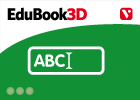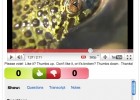Cargando...
Recursos educativos
-
Nivel educativo
-
Competencias
-
Tipología
-
Idioma
-
Tipo de medio
-
Tipo de actividad
-
Destinatarios
-
Tipo de audiencia
-
Creador
Lo más buscado
- Lagos de América
- Ejercicios resueltos primero
- Juegos de matemáticas cuarto
- Juegos matemáticos segundo
- Mapa conceptual del sistema endocrino
- Relieve de Australia
- Repaso de economía educación secundaria
- Alimentos transgénicos en segundo
- actividades matemáticas primaria
- Países de Europa
- Relieve de Africa
- fichas inglés
- Ejercicios escolares para niños de 10 años
- Recurso educativo valor posicional swf
- Experimentos para estudiantes
-

Animal reproduction
EduBook Organización
- 15291 visitas
In the last unit you learnt how humans reproduce sexually. Most other animals also reproduce sexually, by the fertilisation of an egg by a sperm. This involves the participation of a male and a female.…
-

Check. Fertilisation
EduBook Organización
- 3115 visitas
Look at the pictures and answer the questions: What animal is this? What type of fertilisation is characteristic in this animal? How does the embryo develop? In reproduction on land, what are the…
-

Introduction - Animal reproduction
EduBook Organización
- 2858 visitas
In the last unit you learnt how humans reproduce sexually. Most other animals also reproduce sexually, by the fertilisation of an egg by a sperm. This involves the participation of a male and a female.…
-

End-of-unit activities - Animal reproduction
EduBook Organización
- 2475 visitas
In the last unit you learnt how humans reproduce sexually. Most other animals also reproduce sexually, by the fertilisation of an egg by a sperm. This involves the participation of a male and a female.…
-

Initial evaluation 04 - Animal reproduction
EduBook Organización
- 2410 visitas
Complete the sentences with the correct words: In most animals there is a male and a . Animals which are born from a mother are called . Animals which are hatched from an egg are called . To become…
-

End-of-unit evaluation - Animal reproduction
EduBook Organización
- 2340 visitas
In the last unit you learnt how humans reproduce sexually. Most other animals also reproduce sexually, by the fertilisation of an egg by a sperm. This involves the participation of a male and a female.…
-

Game: The dinosaur's eggs
Tiching explorer Organización
- 3983 visitas
Set of activities that help us improve our listening. Choose which group of words you wish to practise. Listen to the word, choose the correct egg and then press 'next'. When you have completed ten goes…
-

Video: Frog Life Cycle
Esl video Organización
- 2138 visitas
This 2 minute video explains the stages in the development of a frog: an egg, a tadpole and finally an adult frogs. Children learn to distinguish amphibians, they can see their environment and their…
-

The Animal Kingdom (II). Vertebrates
EduBook Organización
- 15182 visitas
There are around 50000 species of vertebrates, classified into five main groups: fish, amphibians, reptiles, birds and mammals. Fish are the most primitive group and they have the highest number of…
-

Answer. Animal reproduction
EduBook Organización
- 5001 visitas
Remember what you have studied in this unit and answer: In which group of animals does the embryo develop inside the mother? In which group does it develop inside an egg? In which animals does it…
Te estamos redirigiendo a la ficha del libro...













